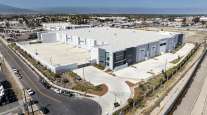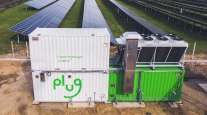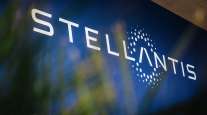Staff Reporter
Fuel Cell Maker Symbio Unveils Class 8 FCEV Demonstrator
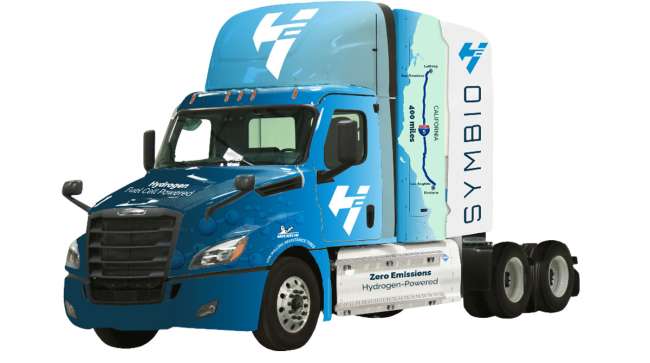
[Stay on top of transportation news: Get TTNews in your inbox.]
A hydrogen fuel cell manufacturer backed by three automotive industry heavyweights unwrapped a Class 8 tractor equipped with its powertrain May 16 in its latest step toward attracting North American passenger and commercial vehicle manufacturers as customers.
Symbio — backed by car and truck maker Stellantis, tire company Michelin and auto component manufacturer Forvia — is eyeing building a manufacturing facility in the U.S. and equipping Ram brand pickups and other trucks with its fuel cell systems.
The demonstrator truck is intended to show off the fuel system’s capabilities in the regional haul sector, and its first stop will be the Advanced Clean Transportation Expo in Las Vegas May 20-24, where the tractor will make its public debut.
After that, toward the end of 2024 the truck will begin 12 months of testing on a 400-mile route between California’s Inland Empire and Northern San Joaquin Valley.
Symbio said the demonstration route consists of four distinct and challenging operating sections: 120 miles of urban Los Angeles roads; the climb up the Grapevine mountain pass that includes a 5% grade along a five-mile segment; and 235 miles of high-speed Central Valley I-5 highway.
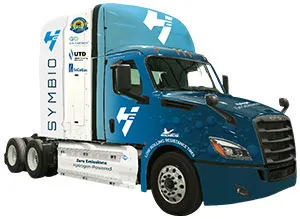
A Freightliner Cascadia tractor was retrofitted with Symbio’s 400-kilowatt StackPack fuel cell system for the demonstration truck. (Symbio)
A Freightliner Cascadia tractor was retrofitted with Symbio’s 400-kilowatt StackPack fuel cell system for the demonstration truck. With a 70-kilogram hydrogen tank aboard, the truck is capable of over 450 miles between fueling stops.
The vehicle will store 66.8 kg of 700-bar hydrogen onboard, with two intra-route fueling stops in the Central Valley during the testing, Symbio said.
“We are thrilled to present the cutting-edge, innovative Symbio’s 400-kW, heavy-duty fuel cell stack that enables a significant engine weight reduction without compromise on performance. This hydrogen-powered Class 8 fuel cell truck is testimonial of Symbio’s fuel cell technology leadership and system integration know-how,” said Rob Del Core, Symbio North America general manager.
Total Transportation Services (TTSI) will carry out testing of the demonstrator truck.
Long Beach, Calif.-based drayage and regional-haul specialist TTSI operates a fleet of more than 800 trucks and serves more than 30 terminals. The company already operates battery-electric and compressed natural gas-powered trucks.
Symbio currently operates an integrated fuel cell gigafactory in Saint-Fons near Lyon in France. The factory is expected to be producing 50,000 fuel cell systems by 2026.
In 2023, the company opened a pilot plant in Temecula, Calif., but wants to build a gigafactory in the U.S. to underpin its ambitions in the light- and heavy-duty truck sector.
Stellantis offers eight hydrogen-powered light and medium commercial vehicle options in Europe with drivetrains supplied by Symbio. The eight are the Peugeot e-Expert Hydrogen and e-Boxer Hydrogen, Citroen ë-Jumpy Hydrogen and ë-Jumper Hydrogen, Opel Vivaro-e Hydrogen and Movano Hydrogen, Fiat Professional e-Scudo Hydrogen and e-Ducato Hydrogen. Stellantis, via its Detroit-based Chrysler Corp. division, is considering developing FCEV options for the Ram brand of pickups. All such vehicles will be equipped with fuel cells produced by Symbio.
Want more news? Listen to today's daily briefing above or go here for more info
Stellantis is not the only legacy passenger car manufacturer with FCEV ambitions in the commercial vehicle space though. GM and Honda began commercial production of hydrogen fuel cells in Brownstown, Mich. for commercial vehicles in January.
On May 17, Honda unwrapped a Class 8 concept truck it too intends to showcase publicly for the first time at ACT. Honda retrofitted a Peterbilt Model 579 for the concept truck. However, no joint venture between Honda and Paccar unit Peterbilt is currently in place, according to the Japanese company.
Toyota is working with Paccar Inc. to develop Kenworth and Paccar FCEV models that are slated to enter production in 2025. Toyota Motor North America launched a hydrogen headquarters in Gardena, Calif., at the start of May to further its heavy-duty truck ambitions.


